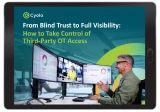Table of Contents
- What is Privileged Access Management (PAM)?
- Key PAM Capabilities
- Why PAM Falls Short in Operational Technology (OT) Environments
- 1. PAM Requires a Separate Solution to Provide Connectivity
- 2. PAM is Built for IT, Not OT
- 3. PAM Cannot Secure Third-Party Vendor Access
- 4. PAM Faces Scalability Challenges and Increases Operational Burden
- The Bottom Line on PAM
What is Privileged Access Management (PAM)?
Privileged access management (PAM) is a subset of Identity and Access Management (IAM) that enables organizations to exert control over the elevated (“privileged”) access and permissions for identities, users, accounts, and systems across an information technology (IT) environment. By “right-sizing” privileged access controls, PAM helps organizations minimize their attack surface and limit the potential damage from external attacks as well as insider threats.
Key PAM Capabilities
Privileged account discovery
Credential vaulting and management
Identity authentication
Least privilege access
Session management
Session recording
Auditing and reporting
Why PAM Falls Short in Operational Technology (OT) Environments
1. PAM Requires a Separate Solution to Provide Connectivity
PAM solutions enforce least privilege access and provide important supervisory controls, such as session recording and auditing. However, a separate solution is needed to actually connect the user to the desired resource. When PAM is used in combination with a problematic remote access tool, like a VPN or jump server, the weaknesses of the access solution are inherited. For VPNs, these weaknesses include potential security vulnerabilities and the need to download an agent; for jump servers, they include a significant operational burden and obstacles to scalability.
How Cyolo Helps: As an agentless all-in-one remote privileged access solution, Cyolo PRO (Privileged Remote Operations) ensures security from the initial point of access through to the termination of the connection. Cyolo PRO is more secure and efficient than a VPN and offers more operational agility than a jump server.
2. PAM is Built for IT, Not OT
The PAM approach is designed to provide extra security for a relatively small number of IT admins or other privileged accounts. Common OT challenges, such as securing third-party access and remote access to critical infrastructure, are simply outside the scope of even the best PAM tools.
In addition, most PAM solutions require a cloud connection, which leaves them unable to support the on-premises, isolated, and legacy-based systems that tend to characterize OT environments. Even when a cloud connection is possible, PAM solutions can impede system responsiveness, introduce friction for administrators, and cause operational disruptions. These may be relatively minor inconveniences in an IT context, but they are dealbreakers for OT.
How Cyolo Helps: Cyolo PRO is purpose-built for the distinctive needs of OT environments. The solution can be deployed in any environment (cloud-connected, on-premises, or fully offline) and is designed to accommodate OT priorities like safety and systems availability. Cyolo PRO can even retrofit legacy systems to support multi-factor authentication (MFA) with no costly upgrades or rip-and-replace.
3. PAM Cannot Secure Third-Party Vendor Access
Securing third-party vendor access to critical systems is a key requirement for many industrial enterprises. Beyond their more general inability to address OT challenges, PAM tools do not solve this important use case.
When PAM is used with a VPN, third-party vendors and contractors must download the VPN onto their device to connect to the organization’s network. Requiring vendors to install a VPN is impractical, as they may work with dozens of different companies operating many different VPNs. Managing third-party PAM use also creates a heavy burden for admins, who face a long, complex process for onboarding new vendors. This isn’t just inconvenient; it can lead to operational delays or system downtime when one-time technicians can’t be quickly credentialed to address an urgent problem.
How Cyolo Helps: In contrast to PAM, Cyolo PRO is designed to ensure simple and secure access for third-party vendors to even the most sensitive systems and resources. The solution is agentless, enabling third parties to easily connect with no downloads needed. Admins also face less of a burden as they can add new users to the correct access policies with just a few clicks and no delays.
4. PAM Faces Scalability Challenges and Increases Operational Burden
PAM is intended to provide elevated controls for a limited number of privileged accounts (typically IT admins or other super users). Expanding PAM use to additional groups of privileged users, such as third-party vendors or remote workers, sounds simple but in reality adds significant complexity for already over-burdened admins. Scaling PAM can also quickly become prohibitively expensive, especially because VPNs, jump servers or other tools are also needed to extend connectivity.
How Cyolo Helps: Cyolo PRO’s unique architecture enables seamless scalability while simultaneously improving operational agility. Deployment across even dozens of sites is fast and easy, and admins can set access and actions controls at both the application and user group levels. Thanks to Cyolo PRO’s multi-tenancy structure, admins have the option to easily manage, control, and standardize access and actions policies in multi-site global organizations as well as smaller ones.
The Bottom Line on PAM
PAM is an important tool for organizations to have in their cybersecurity arsenal, but it cannot satisfy the distinctive requirements of OT environments and is insufficient for securing remote privileged access to industrial controls systems (ICS) and critical infrastructure.
Unlike traditional PAM solutions, Cyolo PRO is purpose-built to meet OT/ICS needs. Cyolo PRO enables organizations in critical industries to safely and securely connect all types of privileged users, including but not limited to third-party contractors, OEM vendors and technicians, and badged employees who remotely manage operations.
Compared specifically to PAM, Cyolo PRO provides far greater security, scalability and adaptability.
Discover the Benefits of Cyolo PRO (Privileged Remote Operations)

Jennifer Tullman-Botzer
Author
Jennifer Tullman-Botzer has over a decade of experience in cybersecurity marketing and is as tired as you are of hackers-in-hoodies stock images. She joined Cyolo in 2021 and currently serves as director of content marketing.

Subscribe to Our Newsletter







